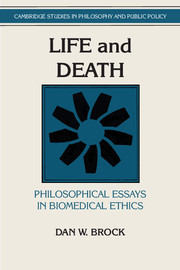Book contents
- Frontmatter
- Contents
- Sources and acknowledgments
- Introduction
- PART I PHYSICIANS AND PATIENTS MAKING TREATMENT DECISIONS
- PART II LIFE-AND-DEATH DECISIONS IN THE CLINIC
- 4 Moral rights and permissible killing
- 5 Taking human life
- 6 Death and dying
- 7 Forgoing life-sustaining food and water: Is it killing?
- 8 Voluntary active euthanasia
- PART III LIFE-AND-DEATH DECISIONS IN HEALTH POLICY
- Index
8 - Voluntary active euthanasia
Published online by Cambridge University Press: 05 June 2012
- Frontmatter
- Contents
- Sources and acknowledgments
- Introduction
- PART I PHYSICIANS AND PATIENTS MAKING TREATMENT DECISIONS
- PART II LIFE-AND-DEATH DECISIONS IN THE CLINIC
- 4 Moral rights and permissible killing
- 5 Taking human life
- 6 Death and dying
- 7 Forgoing life-sustaining food and water: Is it killing?
- 8 Voluntary active euthanasia
- PART III LIFE-AND-DEATH DECISIONS IN HEALTH POLICY
- Index
Summary
Since the case of Karen Quinlan first seized public attention fifteen years ago, no issue in biomedical ethics has been more prominent than the debate about forgoing life-sustaining treatment. Controversy continues regarding some aspects of that debate, such as forgoing life-sustaining nutrition and hydration, and relevant law varies some from state to state. Nevertheless, I believe it is possible to identify an emerging consensus that competent patients, or the surrogates of incompetent patients, should be permitted to weigh the benefits and burdens of alternative treatments, including the alternative of no treatment, according to the patient's values, and either to refuse any treatment or to select from among available alternative treatments. This consensus is reflected in bioethics scholarship, in reports of prestigious bodies such as the President's Commission for the Study of Ethical Problems in Medicine, The Hastings Center, and the American Medical Association, in a large body of judicial decisions in courts around the country, and finally in the beliefs and practices of health care professionals who care for dying patients.
More recently, significant public and professional attention has shifted from life-sustaining treatment to euthanasia – more specifically, voluntary active euthanasia – and to physician-assisted suicide. Several factors have contributed to the increased interest in euthanasia. In the Netherlands, it has been openly practiced by physicians for several years with the acceptance of the country's highest court.
- Type
- Chapter
- Information
- Life and DeathPhilosophical Essays in Biomedical Ethics, pp. 202 - 232Publisher: Cambridge University PressPrint publication year: 1993
- 2
- Cited by



